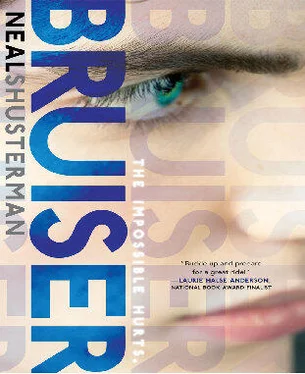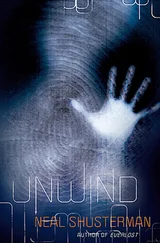Mom and Dad have their discussion, and the answer is still no. The Gortons are denied foster-parent status less than a week later; and as soon as social services can wade through their own paperwork, Brew and Cody will be sent to “the something home for something-something children,” vanishing into the system, never to be seen again.
If the wall Mom and Dad have erected is going to fall, it has to fall soon. It’s Brontë who completes the erosion process, turning herself into a human tsunami, as if it’s a secret superpower. Although I’ll never admit it to her, I’m in awe, and a little bit frightened of her now. I’m there when Jericho falls. It begins with a phone call, which I’m about to pick up; but Brontë, seeing the number on the caller ID, stops me. It rings one more time, and I hear Mom take the call in the hallway. We both listen.
“Excuse me, you’re from whose office?” we hear Mom say. “An attorney? What’s this all about?”
I don’t like the sound of that. When your parents are living on a fraying tightrope, a call from a lawyer is a very bad sign. I turn to Brontë, but the look on her face is more anticipation than dread.
“Let me get this straight—you’re calling for Brontë? Why would you want to speak to my daughter?” Mom listens for a moment more, then Brontë whispers to me: “They won’t tell her a thing— attorney/client confidentiality.”
“You hired a lawyer?”
“Consulted,” Brontë tells me. “Consultations are free.”
The phone call ends abruptly with Mom saying, “No, wait, don’t hang up,” which they obviously do.
Since no one in our family sits down for dinner together anymore, Brontë makes a point of eating with Mom. I join them because I love a good fireworks display. But instead it’s painfully quiet until Mom says, “Brontë, there’s something I want to talk to you about.”
I know that Mom means to broach the topic of the phone call, but instead Brontë blindsides Mom with something else.
“I’ve decided to quit the swim team.”
“That’s not what I… what?”
“I’ve decided I need to get a job instead. I’ve been told that self-sufficiency is the first step.”
Mom’s still mentally backpedaling, trying to catch a gear. “First step toward what?”
“To becoming an emancipated minor.”
Mom takes a deep breath and lets it out, the dots finally connecting in her head. The fact that Brontë actually called a lawyer makes it hit exceptionally hard. “And why would you want that?” she says, trying to sound bright and unbothered by it.
“Well, you have to admit that you and Dad have not exactly been warm and nurturing lately. And the fact that you won’t consider helping Brewster and Cody makes it very clear this is not a place I want to be.”
Then Mom looks Brontë in the eye with the cold gaze of a serious parental warning. “Listen to me, because I will only say this once, Brontë,” she says. “I will not be blackmailed by you.”
Brontë holds the gaze, and strikes back with equal force behind her words. “Actions have consequences, Mom. You taught me that. Your actions are no exception.”
Then she gets up and strides out of the kitchen.
Now I’m alone with Mom, who’s no longer eating. “Wow,” I say; and since I really am blown away by what Brontë has just done, I say “Wow” again, truly speechless.
That night I ask Brontë if she really means it. She seems terrified by the question.
“I don’t make idle threats,” she says—and I suddenly realize that she’s not scared of our parents’ response; she’s scared of her own determination, because if Mom and Dad don’t do something for Brew and Cody, she will quit the swim team, she will get a job, and eventually maybe she will go all the way with her threat to become emancipated.
I want to comfort her somehow; but again, all I can say is “Wow.” Nothing more is said about it until the following day, but then Dad tells Brontë and me that he and Mom are “open to considering the possibility of maybe temporarily helping Brew and Cody if no one else steps forward.”
They schedule an appointment with the social worker, who comes by our house the same day. I suppose she’s trying to make up for botching things the day Uncle Hoyt died. She must have sold used cars in a previous life, because although Mom and Dad keep insisting all they want is information, the appointment ends with an application, fingerprinting, and a background check. “So you’ll already be approved as foster parents should you decide to move forward,” the social worker says; but I think our parents know full well that there’s no closing this door once it’s open.
“God bless you,” the social worker tells them. “God bless you both.”
Then Brontë smothers Mom and Dad in kisses in a way she hasn’t done since we were little. “I love you both so, so much!” she tells them. “I knew you would do the right thing.” Our phone rings a week later. Sometimes when the call is momentous enough, you know exactly who’s calling and why even before you pick up the phone. I’ve never been one to believe in that kind of intuition, but lately I’ve had to broaden my mind to a whole range of things I used to dismiss. When that phone rings, I know just as certainly as I know my own name what the call is about even before Dad says, “Hello?”
The Gortons drive Brew and Cody over early on Wednesday evening. Mrs. Gorton is all teary-eyed as she hugs Cody, as if she’s either sending him off to summer camp or handing him over to agents of Satan.
They chat with my parents briefly. Brew shakes my parents’ hands tentatively as they welcome him. Cody doesn’t bother with such formalities; he’s already raced in and has made himself at home. All the while I notice the Gortons never make eye contact with Brewster; and when they tell him good- bye, there’s a chilly formality to it, like they’d rather not say anything to him at all. They hurry to their car, they drive off, and there it is: Brewster Rawlins, creepy dude deluxe, is now my foster brother.
This is the first time we’re seeing Brew face-to- face since his uncle died. Not a big deal for me, but I know it’s a big deal for my sister. He stands at the threshold sheepishly, holding a small suitcase that contains all the worldly possessions he chose to salvage from the farmhouse. He faces Brontë in our foyer in a guarded standoff in which nothing much is said.
“Hi.”
“Hi.”
“You okay?”
“Yeah, you?”
“Yeah.”
Walking on eggshells cannot begin to describe the moment—and the dinner that follows is the very definition of discomfort…or at least it starts that way.
The mood is set right away by Cody, who can’t stop talking about how they found Uncle Hoyt. “He was all pale, like the blood been sucked outta him.” To hear him tell it, you’d think the man got attacked by a chupacabra—and I’m sure the story gets wilder every time he tells it. By now Cody has had a haircut, compliments of the Gortons, and he looks semicivilized. Still, he keeps shaking his head like he’s trying to fling hair out of his face. That habit’s not going to go away for a good while.
“And his eyes,” says Cody, “they was open and all bulgy, like he saw a ghost!”
“It’s very sad,” Brontë says. “Would anyone like some milk?”
“Did you hear everything in the house was all broke up?” Cody says. “Nothing left—like he blew it apart with his mind before he died!”
“That’s enough, Cody,” Brewster says under his breath; but my mom gently pats Cody’s hand.
“Talk about it all you want, Cody,” she tells him. “It’s very cathartic to talk it out.”
Читать дальше











